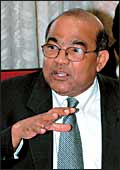 |
| Chinese President Hu Jintao:
Can you spot the slowdown? |
In
the horribly cut-throat environment that characterises the global
economy, a rival's slowdown is often greeted with whoops of delight
in opposition camps. But what happens when the engine of global
growth itself begins to decelerate? That's a question Indian economic
planners are grappling with right now.
The facts: The latest annual report of the
un Economic and Social Commission for Asia-Pacific says China's
GDP growth rate is expected to fall to 8.5 per cent this year,
a full percentage point lower than last year, and further to 7.8
per cent in 2006. As a result, the report forecasts, the entire
Asia-Pacific region will grow at only 6.2 per cent, down from
last year's growth rate of 7.2 per cent.
What implications will this have for the Indian
economy? Steel, coal, iron ore, oil and chrome prices will definitely
fall, since China currently consumes 40 per cent of the world's
cement output and accounts for 90 per cent of the growth in world
steel demand. Result 1: lower realisations for Indian companies
like Tata Steel, Essar Steel and ONGC, even though some of them
don't export these commodities to China. Result 2: input costs
of most other companies will fall. So, India Inc. can look forward
to some improvement in its margins and profitability. Alternatively,
consumers can look forward to lower prices almost across the board
if companies decide to pass on the lower prices to them. Either
way, it should provide a fillip to consumption and push up the
GDP growth by several basis points. This is expected to have a
positive fallout on stock prices.
ADVANTAGE INDIA
How the Chinese slowdown can benefit India.
|
»
Good for Indian companies which use steel,
cement and oil as inputs
»
Greater inflows of foreign direct investments into India
»
Help Indian exporters grab a larger share of global trade
»
Push up consumption because of low prices
»
Boost the stock market |
Also, some of the investments currently going
to China will be diverted to India. But don't expect miracles
here. "Even if there is a perception that India is growing
and China is slowing, it is unlikely to make India, the next big
FDI destination," says Andrew Holland, Executive VP (Research),
DSP Merrill Lynch. The reason: poor infrastructure and sectoral
caps on foreign investments are still huge impediments to the
free inflow of FDI.
So what does the balance sheet say? A slowing
dragon will definitely add a spring to India's step, but don't
expect the country to become the engine of global growth anytime
soon.
-Ashish Gupta
Whither Hong Kong?
EU's refusal to cut farm subsidies is likely
to derail the forthcoming WTO ministerial round.
 |
| Minister Nath: No hope for
WTO talks |
An
air of pessimism surrounds the forthcoming Ministerial Round of
the World Trade Organization (WTO) in Hong Kong beginning December
5. Most people expect it to end in failure. Agriculture remains
the biggest stumbling block. The spoilsport this time: France.
As Union Commerce & Industry Minister Kamal Nath said at recent
press conference: "Signs of movement on the part of developed
countries-mainly responsible for trade distortion and protection-have
been scarce and insufficient.''
Recognising this, WTO Secretary General Pascal
Lamy has said the French, and tacit EU, refusal to reduce the
huge subsidies it pays its inefficient farmers means the organisation's
148 members will have to lower their goals for the Hong Kong meeting.
That's because unless there is some consensus on the farm front,
there is unlikely to be any movement on any other sector. The
g-20 has made it clear that it will not discuss any other issue,
including Non-Agriculture Market Access (NAMA), unless the subsidy
question and the "food security and livelihood concerns of
poorer nations" are sorted out to its satisfaction. NAMA
is important to both the US and the EU as it deals with reduction
in industrial tariffs in the developing world.
India has complicated the issue further by
making a robust services sector offer. It has also made it clear
that it will bend on agriculture and industrial tariffs only if
it wins significant concessions on cross-border supplies (Mode
I) and movement of natural persons (Mode IV).
"We could end up having just another
approximation round at the Hong Kong Ministerial Meet," says
Pradeep S. Mehta, Secretary General, Consumer Unity & Trust,
an NGO working on the WTO issues. This means ministers will only
agree to discuss the modalities of various issues at the next
round. Wonder why they all need to congregate in Hong Kong for
that?
-Ashish Gupta
Cleaning Up Banks
The RBI's decision to allow foreign investments
in ARCs will go a long way in tackling the issue of NPAs.
 |
| RBI's Reddy: The foreign
hand |
It's
a hangover from the country's ill-fated, but long-standing tryst
with socialism. The crony capitalism that it bred saddled the
banking system with huge non-performing assets (NPAs). That's
really a polite term for bank loans that companies have refused
to repay. At last count, the figure totted up to a staggering
Rs 60,000-1,00,000 crore. The first Asset Reconstruction Company
(arc), the magic wand that promises to clear up this messy Augean
Stable, was set up in 2003 under the Securitisation and Reconstruction
of Financial Assets and Enforcement of Security Interest Act,
2002, but it simply didn't have the kind of money required to
even make a dent on this problem. Now, the government has given
the sector a booster dose. On November 8, the Reserve Bank of
India (RBI) announced that it was opening up arcs to foreign direct
investments (FDI) up to 49 per cent. Foreign institutional investors
(FIIs), however, were barred from buying into these companies.
Just two days later, the RBI issued another circular allowing
FIIs registered with the Securities and Exchange Board of India
to invest up to 49 per cent in security receipts (SRS) issued
by the arcs, subject to a cap of 10 per cent for individual FIIs.
How do arcs work? They buy bad loans from
banks at a fraction of their face value and then pursue the defaulting
companies to recover the dues. Their profit: the difference between
the amount recovered and the amount paid. Globally, the norm is
for arcs to buy distressed assets for cash, but in India, they
will be allowed to issue SRS; these are basically IOUs for the
agreed amount that will usually be redeemed only on recovery of
funds either through restructuring or liquidation.
"Allowing foreign investments in arcs
will lead to greater competition and also allow them easier access
to huge amounts of money," says Ashwani Puri, Executive Director,
PricewaterhouseCoopers. Foreign players like Standard Chartered
Bank, Citicorp and Barclays Bank have already expressed interest
in entering the arena. And analysts believe that India can easily
attract $5 billion (Rs 22,500 crore) over the next one-and-a-half
years as a result of this policy change.
- Ashish Gupta
|






